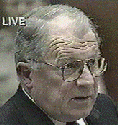
Having defended numerous high-profile defendants since the 1960's, F. Lee Bailey was an accomplished defense attorney at the time of the Simpson trial. Bailey's clients included the likes of the Samuel Sheppard, the doctor who was accused of murdering his wife, and who became the inspiration for the television series and movie The Fugitive.
The weekend before Simpson's preliminary hearing, Bailey was contacted by his friend, Robert Shapiro, who asked him to assist in the defense of Simpson. The two defense attorneys were quite close. Bailey had been named as godfather to Shapiro's oldest child. Bailey had favorably defended Shapiro in a drunk driving case twelve years prior to the Simpson case. When Bailey himself had been charged with drunk driving, he used his friend Shapiro to successfully represent him. Alcohol seemed to be one of Bailey's weaknesses. The first lines of his 1975 memoir read, "Heavy trials make me thirsty." Ignoring his friends advice to cut back, Bailey claimed that "it's my fuel."
Bailey's lust for the spotlight made the Simpson trial quite enticing. Always a fan of the media, Bailey held numerous press conferences to discuss the progress of the case.
In court, Bailey was a master as cross-examination. Hungry for the opportunity to impeach Detective Fuhrman on cross-examination, Bailey said in a press conference that, "any lawyer in his right mind who would not be looking forward to cross-examining Mark Fuhrman is an idiot."
In 1994, at the same time as the Simpson trial, Bailey and Shapiro represented one of the biggest marijuana dealers in the world. As part of a plea bargain, the client agreed to turn over his assets to the U.S. Government. Included in his assets were a large amount of stock, which increased in value from six million to twenty million between the time of the plea and when the government attempted to collect. As the deal was not put in writing, a federal judge held a hearing to determine the terms of the arraignment. The lead witness for the government was Shapiro, who testified that his understanding of the agreement was that the government was entitled to the appreciated portion of the stock. When Bailey did not produce the stock or the cash equivalent, the judge threw Bailey in jail. After forty-four days in a federal detention center, Bailey gave up his claim to the stock. Viewing Shapiro's acts as betrayal, Bailey has sworn never to deal with Shapiro again.
